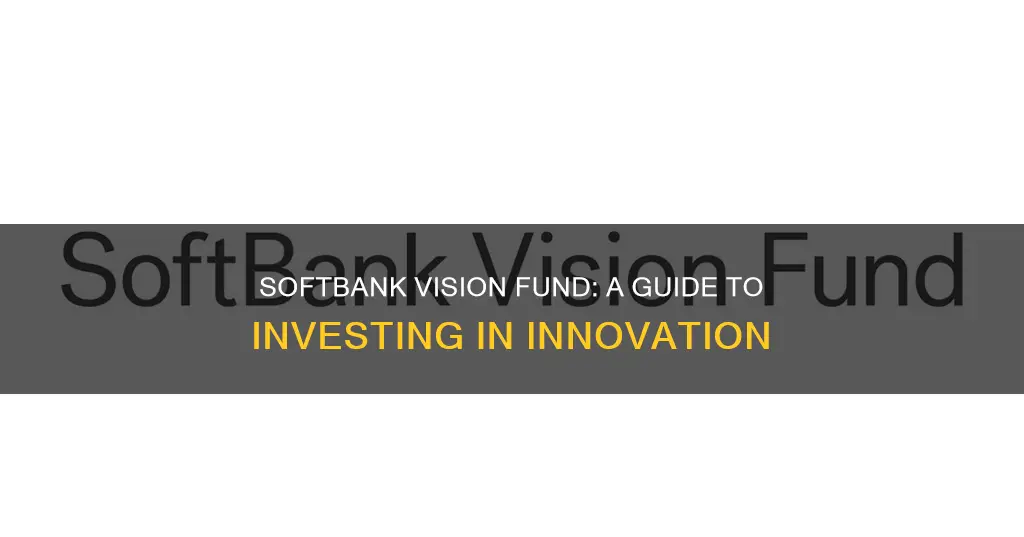
SoftBank Vision Fund is a subsidiary of the SoftBank Group that specializes in growth capital and social impact investments. The fund was launched in 2017 by SoftBank founder Masayoshi Son with a massive $100 billion in funding, several orders of magnitude larger than any other tech investment fund at the time. The fund's goal is to invest in businesses and foundational platforms that SoftBank believes will revolutionize and innovate the world, with a focus on sectors like artificial intelligence, robotics, computational biology, biotech, cloud technologies, and financial technology. SoftBank Vision Fund has made significant investments in companies such as Uber, DoorDash, and NVIDIA, with a mix of successful gains and losses. The fund's performance has been mixed, with large losses reported due to collapsing valuations of firms like Uber and WeWork, but also notable successes such as the DoorDash investment, turning a $680 million investment into an $11.5 billion gain.
| Characteristics | Values |
|---|---|
| Type of Fund | Private Equity, Venture Capital |
| Specialization | Growth Capital, Social Impact Investments |
| Headquarters | London, England, United Kingdom |
| Parent Organization | SoftBank Group |
| Sectors | Internet of Things, Artificial Intelligence, Robotics, Communications Infrastructure, Telecoms, Computational Biology, Biotech, Cloud Technologies, Software, Consumer Internet Businesses, Financial Technology, Mobile Apps |
| Notable Investments | Uber, NVIDIA, DoorDash, ByteDance, Didi, Paytm, Slack, WeWork, ARM, Alibaba |
| Fund Size | $100 billion (Vision Fund 1), $108 billion (Vision Fund 2) |
What You'll Learn

SoftBank Vision Fund's focus on AI and tech
SoftBank Vision Fund is a venture capital fund founded in 2017, with a focus on investing in companies that are developing technologies in line with global artificial intelligence trends. With over $100 billion in capital, it is the world's largest technology-focused investment fund. The fund has a diverse range of investments spanning various sectors, including the Internet of Things, mobile apps, financial technology, and biotechnology.
The fund's notable investments include Uber, where SoftBank acquired a 15% stake, and NVIDIA, with a stake reportedly worth $5 billion. SoftBank has also transferred a 25% stake in its ARM Holdings subsidiary to the Vision Fund. The fund has brought innovation and supported an AI technology ecosystem by investing in companies like Arm, Agile Robots, and Wiliot, which form the foundation of AI innovation with their chip architecture, advanced robotics, and sensor technologies.
SoftBank Vision Fund 2, founded in 2019, faced challenges due to the poor performance of portfolio companies and high-profile failures. As a result, it raised less than half of its $108 billion goal, with all funding coming from SoftBank itself. However, in May 2021, SoftBank announced that the total fair value of both funds as of March 31, 2021, was $154 billion, and the funds made a record profit of $36.99 billion due to successful investments.
The SoftBank Vision Funds continue to focus on AI and tech, leveraging their portfolio of leading tech companies to build an ecosystem of firms employing artificial intelligence. This includes companies like ByteDance, which enables people to discover and create content powered by technology, and Aurora, which delivers the benefits of self-driving technology. With their size and reach, the funds facilitate synergies and support their portfolio companies in entering new markets.
A Beginner's Guide to ETF Fund Investment
You may want to see also

The fund's performance and losses
The SoftBank Vision Fund was created in May 2017 by the SoftBank Group and the Public Investment Fund (PIF). With over $100 billion in capital, it is the world's largest technology-focused investment fund. The fund has made several notable investments, including in Uber, NVIDIA, and Arm Holdings.
However, the fund has also experienced significant losses and underperformance. One notable loss came from its investment in Nvidia. While the fund recorded a $3.3 billion return on its Nvidia investment, it was forced to sell all its shares due to a prolonged plunge in Nvidia's stock price. Subsequently, Nvidia experienced a rapid transformation into one of the world's most valuable companies, causing SoftBank Vision Fund to miss out on significant gains.
In 2020, SoftBank faced criticism as multiple startups in its portfolio started cutting staff and its highly publicized buyout of WeWork after its failed IPO. This led to a decline in investor confidence in the Vision Fund. In May 2020, SoftBank announced that the Vision Fund had lost $18 billion, resulting in layoffs of 15% of its staff.
The fund's troubles continued into 2022, with a record loss of 3.5 trillion yen ($27.4 billion) for its financial year ending on March 31, 2022. This loss was primarily due to the plummeting valuation of its stock portfolio, including costly failures in investments such as Katerra, Wirecard, and Zymergen. The magnitude of this failure led to widespread criticism of SoftBank's investing behaviour and competence.
By early 2023, the fund's profitability issues became more severe, with a decline in return on investment prospects and record losses. In May 2023, SoftBank disclosed that its Vision Fund lost a record $32 billion in the fiscal year ending in March 2023. This loss was attributed to poor performance in unlisted startups in its portfolio, despite a rebound in tech stocks.
Hedge Fund Investing in Singapore: A Comprehensive Guide
You may want to see also

SoftBank's subsidiaries and investments
SoftBank Group Corp. is a Japanese multinational investment holding company that focuses on investment management. The group primarily invests in technology companies that offer goods and services across a multitude of markets and industries, including the internet, robotics, automation, artificial intelligence, software, logistics, transportation, biotechnology, and more.
- Arm Holdings (semiconductors)
- Alibaba (e-commerce)
- OYO Rooms (hospitality)
- WeWork (coworking)
- Deutsche Telekom (telecommunications)
- Sprint (mobile network operator)
- Yahoo! Japan (internet company)
- ARM Holdings (semiconductor maker)
- NVIDIA
- Uber
- OlaCabs
- Snapdeal
- Housing.com
- Aldebaran Robotics/SoftBank Robotics (a French robotics company that co-designed Pepper, a humanoid robot, with SoftBank)
- Coupang (a Korean e-commerce website)
- Boston Dynamics (robotics company)
- Paytm (Indian fintech company)
- Flipkart (Indian e-commerce company)
- Auto1 (German used-car sales portal)
- DoorDash
- Walmart
- Opendoor (home-selling startup)
- ParkJockey (parking lot startup)
- Grab (ride-hailing startup)
- GungHo Online Entertainment
- Brightstar Corporation
- Didi Chuxing (ride-hailing firm)
- Line Corp. (a new subsidiary under Naver Corporation and SoftBank Group)
- Z Holdings (a subsidiary under SoftBank Group)
- SB Energy India
- Adani Green Energy
- Perplexity AI (AI search startup)
- Cubic Telecom (Irish technology company)
A Guide to Aditya Birla's Mutual Fund Investment
You may want to see also

Requirements to invest in the fund
The SoftBank Vision Fund is a subsidiary of the SoftBank Group that specializes in growth capital and social impact investments. The fund typically invests in businesses within the following sectors:
- Internet of Things
- Artificial Intelligence (AI)
- Robotics
- Communications infrastructure
- Telecoms
- Computational biology
- Biotech
- Cloud technologies and software
- Consumer internet businesses
- Financial technology
- Mobile apps
As the SoftBank Vision Fund involves investing in private equity, there are stringent requirements that must be satisfied by potential investors. These requirements are put in place by the Securities and Exchange Commission due to the extra risks associated with private companies, such as requirements to not sell for extended periods, limited parties to sell a stake to, and sometimes unprofitable operations. To be eligible to invest in the SoftBank Vision Fund, you must be an accredited investor, meeting at least one of the following criteria:
- A net worth of $1 million or more, excluding the value of a primary residence
- A minimum income of $200,000 per year for at least two years if single
- A combined minimum income of $300,000 per year for at least two years if married
It is important to note that investing in private equity carries higher risks and potential volatility compared to publicly traded companies. Private deals can lead to rapid changes in valuations and dilution of shareholder values. Therefore, investors should carefully consider these risks before deciding to invest in the SoftBank Vision Fund.
Passive Investing: Index Funds and Their Benefits
You may want to see also

The fund's impact on SoftBank's business
SoftBank Vision Fund has had a significant impact on SoftBank's business, with the fund's performance closely tied to the company's overall success. The fund's creation in 2017, with over $100 billion in capital, solidified SoftBank's position as a leading technology investor, focusing on artificial intelligence, robotics, and the internet of things.
The fund's initial success, such as its $3.3 billion return on its Nvidia investment, bolstered SoftBank's reputation and attracted high-profile investors like Apple and Qualcomm. However, the fund's performance has been volatile, with notable failures and criticism of its investing strategy. For example, in 2020, multiple SoftBank-funded startups started cutting staff, and in 2022, the fund posted a record loss of $27.4 billion. This volatility has had a direct impact on SoftBank, with its share price and investor confidence fluctuating in response to the fund's performance.
The fund has also influenced SoftBank's investment strategy and focus. SoftBank has increasingly shifted its investments towards artificial intelligence, robotics, and technology companies, reflecting the fund's mandate. This shift has led to some controversial decisions, such as the buyout of WeWork, which ultimately failed and damaged investor confidence in the fund.
Additionally, the fund has provided SoftBank with diverse investment opportunities, particularly in private equity. The fund invests in both publicly traded companies and private companies, with the latter often offering higher potential returns but also carrying greater risks. SoftBank's involvement in the fund has given its shareholders exposure to these private companies, which they may not have accessed otherwise.
Overall, the SoftBank Vision Fund has had a significant impact on SoftBank's business, shaping its reputation, investment strategy, and financial performance. The fund's successes and failures have been closely intertwined with SoftBank's trajectory, highlighting the risks and rewards of its venture capital endeavours.
Debt Fund Investment: Choosing the Right Option
You may want to see also
Frequently asked questions
The SoftBank Vision Fund is a subsidiary of the SoftBank Group that specializes in growth capital and social impact investments. The fund aims to invest in businesses and foundational platforms that will revolutionize and innovate the world.
The SoftBank Vision Fund invests in sectors including the internet of things, artificial intelligence, robotics, communications infrastructure, telecoms, computational biology, biotech, cloud technologies and software, consumer internet businesses, financial technology, and mobile apps.
The SoftBank Vision Fund has reported both major gains and losses. The fund turned a $680 million investment in DoorDash into $11.5 billion, but it has also posted record losses of $17-18 billion due to collapsing valuations of firms like Uber and WeWork.
The SoftBank Vision Fund is a private equity fund, which means it is off-limits to most investors due to the extra risks that accompany private companies. To invest in the fund, you would need to be an accredited investor with a net worth of $1 million or an income of at least $200,000 for two years if single and $300,000 if married. Alternatively, you can invest in SoftBank's stock to gain ownership of the businesses in the fund.







